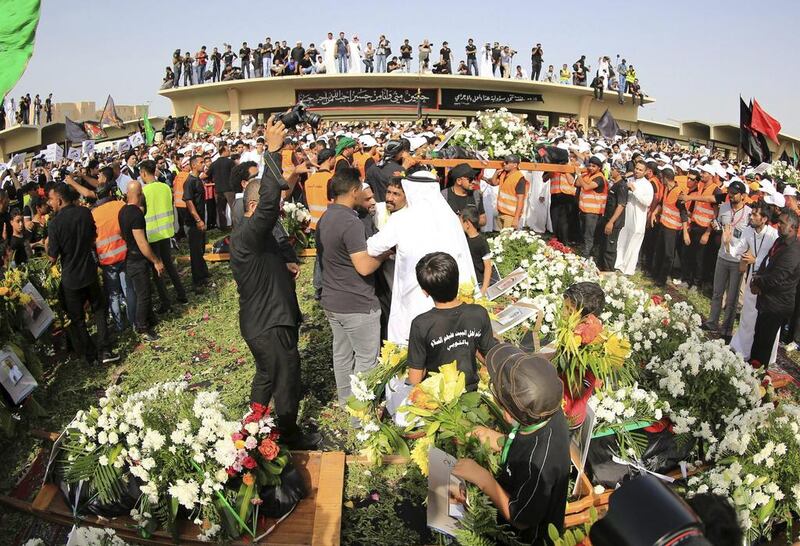The role of clerics in stoking tensions is again under scrutiny in Saudi Arabia. ISIL’s suicide bombing inside a Shia mosque in Al Qudeeh on May 23 has triggered an important debate in the kingdom that should not be missed.
Last year, a similar debate following ISIL’s takeover of Mosul and the subsequent carnage committed in the name of Islam, led many activists in Saudi Arabia to question the roots of such acts. For example, Saudi commentator Ibrahim Al Shaalan tweeted: “ISIL’s actions are but an epitome of what we’ve studied in our school curriculum. If the curriculum is sound, then ISIL is right, and if it is wrong, then who bears responsibility?”
After last weekend’s attack, similar questions have been raised. A day after the bombing, Tariq Al Hamid, a prominent Saudi writer, criticised the sectarian incitement that still spewed in schools and at the pulpit. He said: “What needs to be said, especially after the Al Qudeeh terrorist attack that targeted Saudi Shia nationals, is that the educational, religious, cultural and media discourse in Saudi Arabia must be changed ... through laws and regulations. Reform must punish incitement in all forms, at traditional and other pulpits.”
Al Hamid added that reform would prevent a “fertile ground that turns young Saudis into fodder in any battle” taking place in the region. He said that attacks target both Sunnis and Shia in the country, citing the ISIL cell recently uncovered by Saudi authorities, which targeted security officers. Equally important, he echoed a rare admonition of the kingdom’s top clerics by the late King Abdullah about the failure of religious and media figures at speaking out against extremists.
Saudi Gazette’s editor was similarly candid in an article titled “Sectarian divide threatens national security”. He criticised clerics who he said spewed hatred and spread falsehood. “The perpetrators of these murderous acts are driven by an insane ideology disseminated by self-appointed clerics,” he wrote. “For too long, we have kept quiet as they used the mosques, the media ... to spread their evil philosophy.”
Even those who were quick to blame Iran, either for direct involvement or for taking advantage of the terror act, have conceded that the education system bears some blame. For example, Abdullah Al Utaibi, a Saudi analyst, who blamed Iran for the bombing in an article for Asharq Al Awsat, added: “Is there a link between the Al Qudeeh bombing and extremist religious rhetoric by Sunnis? Yes, of course.”
Such voices have been steadily growing in Saudi Arabia. The role of clerics and educators in stoking sectarianism and extremism has frequently led to such profound soul searching. The question is how officials deal with this dilemma: to fight extremism in the region, which seems to be the country’s top priority, while clerics inside the kingdom contribute to it.
It is important to note that this is a new challenge for Saudi Arabia. Its regional priorities shifted, particularly since 2011, to focus on growing extremism in the region and its risks on stability at home. Riyadh has taken a number of steps since then to undercut extremists’ educational and financial resources emanating from inside and outside the country. These measures are still in progress, and much more needs to be done.
Attitudes inside the country are an important part of this effort. There is widespread recognition in Saudi Arabia that extremism is a long-term menace that tops all other challenges, even though many outsiders still view Riyadh’s foreign policy through the narrow prism of sectarian rivalry with Iran. For many Saudis, such as Al Utaibi, Iran’s regional influence is often seen through its divisive nature that stokes sectarian and extremist rhetoric. And that is exactly where the debate about the divisive role of clerics in Saudi Arabia becomes most relevant.
Despite widespread condemnation of the bombing in Qatif, many still view Shia as not proper Muslims. On social media, that was apparent in the refusal of some to donate blood fearing “their blood would mix” with the blood of Shia. Such attitudes should not be taken lightly, even if only a minority would express sectarian hatred in such an abominable way. King Salman spoke out against sectarianism as a tool for extremists, and vowed to punish perpetrators and those who sympathise with the act.
Last year, the significant soul-searching trend that was common after the ISIL capture of Mosul soon faded in favour of political and religious bickering. The new debate shows that the questions still linger.
Hassan Hassan is a Middle East analyst and co-author of ISIS: Inside the Army of Terror
Follow on Twitter: @hxhassan





